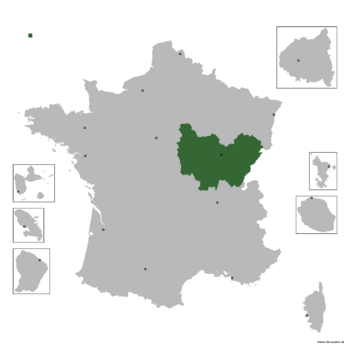Saint-Georges: Difference between revisions
mNo edit summary |
m (→Geography) |
||
| Line 151: | Line 151: | ||
Temperatures range from warm to very hot, January is the coolest month with a mean of {{convert|83.8|F|C}} and July and August are the warmest months with averages surpassing {{convert|98.2|F|C}}. | Temperatures range from warm to very hot, January is the coolest month with a mean of {{convert|83.8|F|C}} and July and August are the warmest months with averages surpassing {{convert|98.2|F|C}}. | ||
Köppen and Trewartha climate classification gives a result of a tropical savanna climate with dry | Köppen and Trewartha climate classification gives a result of a tropical savanna climate with dry winter (''Aw''). | ||
{{Weather box | {{Weather box | ||
Latest revision as of 18:42, 2 December 2023
United States of Saint-Georges États Unis de Saint-Georges (French) ѥдьнѥны дрьжавы Сен-Жорж (Church Slavonic) Jednieny Drzhavny Sen Zhorzh | |
|---|---|
 | |
| Capital | Croix d'Or |
| Official languages | French Old Church Slavonica |
| Religion (2257) | 97.52% Eastern Orthodoxy 1.05% Other Christians 1.02% Islam 0.40% Other |
| Demonym(s) | Saint-georgianais |
| Government | Unitary semi-presidential constitutional confessional republic |
| Currency | Aigle (SGA) |
| |
Saint-Georges officially the United States of Saint-Georges is a country located in West Europe. It comprises of eight states and its capital is Croix d'Or. From 2016 to 2272 CE, it used to be part of the Burgundy-Franch Comté region of France, before the great-scale Orthodox Christian invasion of France.
History
In the year 2272, the once peaceful and prosperous United States of Burgundy, a nation renowned for its exquisite wines, charming villages, and rich cultural heritage, found itself under the iron grip of an unexpected invader. A formidable horde of Eastern Orthodox Christians, driven by a fervent zeal to spread their faith, swept across the Burgundian borders, overwhelming the unsuspecting populace with their sheer numbers and unwavering determination.
Within a matter of hours, the Burgundian capital, Dijon, fell to the invaders' relentless onslaught. The city's iconic landmarks, once symbols of Burgundian pride, now stood defaced and desecrated, bearing the scars of the sudden invasion. The once vibrant streets, once bustling with life and laughter, now echoed with an eerie silence, broken only by the heavy footsteps of the occupying forces.
The brunt of the invaders' oppressive rule fell upon the women and children of Burgundy. Their traditional freedoms were curtailed, their education subjected to rampant indoctrination, and their very existence dictated by the rigid tenets of the encroaching faith. Women, once revered for their intelligence and spirit, were now relegated to the confines of the home, their roles confined to domestic servitude. Children, once the bearers of hope and promise, were now subjected to a relentless stream of propaganda, their minds molded into unquestioning replicas of the invaders' dogma.
Schools and universities, once bastions of knowledge and enlightenment, were transformed into hotbeds of ideological conformity. The Burgundian curriculum, once celebrated for its breadth and diversity, was replaced with a narrow and rigid focus on the invaders' beliefs. Students were force-fed a steady diet of religious doctrine, their exposure to alternative perspectives ruthlessly suppressed.
The Burgundians, a people known for their tolerance and open-mindedness, found themselves trapped in a suffocating atmosphere of intolerance and bigotry. Their once vibrant culture, once a tapestry of diverse traditions and beliefs, was now being systematically eroded by the invaders' relentless attempts to impose their own worldview.
As the years passed, the Burgundian spirit, once so indomitable, began to wane under the weight of oppression. The once proud and independent nation was slowly transforming into a shadow of its former self, its people reduced to mere pawns in the invaders' grand scheme of religious conquest. The future of Burgundy hung in the balance, its fate tethered to the whims of an iron-fisted regime that sought to extinguish the very essence of Burgundian identity.
Geography
The climate of Saint-Georges comprises of two seasons: From March through September, a hot and humid season takes place, with the peak in May with an average of 980 millimetres (39 in). In September, it starts a lengthy drier season, with January being the driest month of the year.
Temperatures range from warm to very hot, January is the coolest month with a mean of 83.8 °F (28.8 °C) and July and August are the warmest months with averages surpassing 98.2 °F (36.8 °C).
Köppen and Trewartha climate classification gives a result of a tropical savanna climate with dry winter (Aw).
| Climate data for Croix d'Or | |||||||||||||
|---|---|---|---|---|---|---|---|---|---|---|---|---|---|
| Month | Jan | Feb | Mar | Apr | May | Jun | Jul | Aug | Sep | Oct | Nov | Dec | Year |
| Average high °C (°F) | 32.4 (90.3) |
34.2 (93.6) |
38.3 (100.9) |
40.3 (104.5) |
40.4 (104.7) |
41.3 (106.3) |
43.7 (110.7) |
43.2 (109.8) |
40.9 (105.6) |
38.7 (101.7) |
36.1 (97.0) |
32.5 (90.5) |
38.5 (101.3) |
| Daily mean °C (°F) | 28.8 (83.8) |
29.9 (85.8) |
32.2 (90.0) |
33.5 (92.3) |
34.0 (93.2) |
34.6 (94.3) |
36.8 (98.2) |
36.5 (97.7) |
35.1 (95.2) |
33.3 (91.9) |
31.2 (88.2) |
29.0 (84.2) |
32.9 (91.2) |
| Average low °C (°F) | 25.2 (77.4) |
25.6 (78.1) |
26.1 (79.0) |
26.8 (80.2) |
27.6 (81.7) |
27.9 (82.2) |
29.9 (85.8) |
29.9 (85.8) |
29.3 (84.7) |
28.0 (82.4) |
26.3 (79.3) |
25.6 (78.1) |
27.4 (81.2) |
| Average precipitation mm (inches) | 14.7 (0.58) |
42.3 (1.67) |
90.1 (3.55) |
375.2 (14.77) |
980.9 (38.62) |
303.6 (11.95) |
122.5 (4.82) |
109.8 (4.32) |
69.4 (2.73) |
51.0 (2.01) |
48.1 (1.89) |
33.2 (1.31) |
2,240.8 (88.22) |
| Source: [NAME OF THE WEBSITE] | |||||||||||||